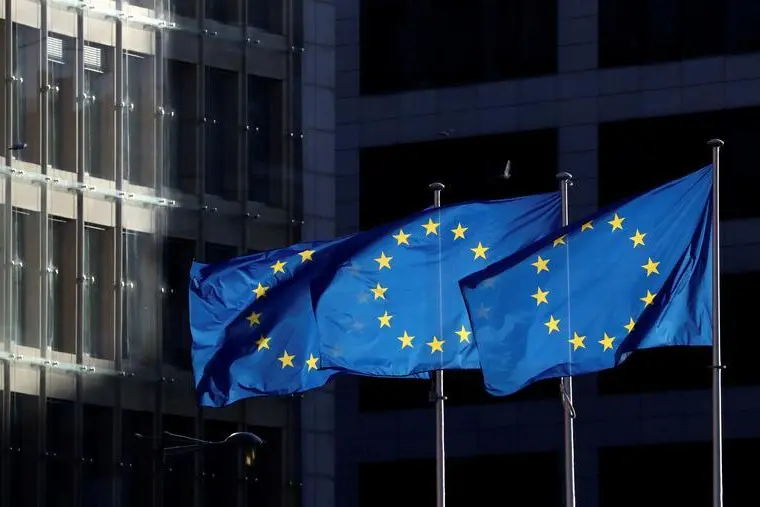PHOTO
Presidents and prime ministers from the EU-27 countries will convene virtually on Friday to discuss the proposed European recovery fund and a new long-term budget. While these matters are mainly economic in nature, they represent what could become a major political milestone in the postwar history of European integration.
Last month, the European Commission laid out its vision for post-coronavirus economic recovery across the continent with a proposed €750 billion ($843 billion) stimulus plan. To much self-acclaim, President Ursula von der Leyen asserted: “This is Europe’s moment… we either go it alone… or we pave a strong path for our people and the next generation.”
While Von der Leyen was long on rhetoric, she was right to highlight that the pandemic has shaken Europe to its core. This is not just illustrated by the huge number of deaths, but also by the economic fallout. The European Central Bank forecasts a 15 percent contraction of gross domestic product in the euro zone in the second quarter of this year, while the European Commission has said that the 27 EU countries together could contract by 7.4 percent this year.
The pandemic has exacerbated the bloc’s vulnerabilities, which in the past decade have been driven by the euro zone crisis, an influx of migrants, and growing Euroskepticism, including Brexit. In so doing, it has also intensified the political fault lines across the continent, widening long-standing splits between some northern and southern states. In particular, there are clear and present divisions between Spain and Italy, which have been hit hardest by the crisis, and the so-called “frugal four” of the Netherlands, Finland, Denmark and Austria, which tend to be more fiscally conservative.
The European Commission has proposed that the €750 billion fund be divided into €500 billion of grants and €250 billion of loans. But a battle royal may lie ahead, as national governments, the European Parliament and the European Commission negotiate not just over the plan’s total budget, but also how much will be linked to grants (favored by Italy and Spain) and how much to loans (the preference of the frugal four).
If the ambitious European Commission blueprint is ultimately ratified in the coming weeks, it could prove a major milestone in the integration of Europe, given the prospect of mutualized debt being used as a funding tool for the first time and potentially paving the way for greater EU supranational powers of taxation. There is even talk of a “Hamiltonian moment” for Brussels in reference to Alexander Hamilton, the treasury secretary of the newly created United States of America, who in 1790 convinced Congress of the benefits of a common debt.
That this moment has arisen reflects not just the stresses that coronavirus has brought to the continent, but also Brexit, given that the UK would have been skeptical of this federalist agenda.
While Brexit and the proposed EU-UK trade deal are not officially on Friday’s agenda, they will be a key topic of informal discussion after Prime Minister Boris Johnson on Monday spoke with Von der Leyen and European Council President Charles Michel. Johnson, who reconfirmed last week that the Brexit transition period will end in December, asserts that a trade agreement can be reached in July — but that assessment is very likely overly optimistic, even with the extra “oomph” in negotiations that he advocates.
Johnson and his EU counterparts pledged to redouble their efforts to agree the broadest possible trade deal, which could then be ratified in or before December. With the mood music from Monday’s session upbeat, a breakthrough remains possible in the coming weeks, with a deal potentially hammered out during the German presidency of the EU, which runs from July to December. But, with deadlines closing in fast, there remains a significant likelihood of a hard, potentially disorderly end to the transition with no UK-EU agreement.
The ongoing Brexit talks may serve as a warning to the EU-27 — in the midst of their continued divisions over the coronavirus stimulus plan and long-term budget proposals — that it is vital for the continent to come together in the face of its worst economic shock for decades. As ever, it will probably be France and Germany, the traditional motors of European integration, which are most likely to forge a consensus between the competing interests.
Whether or not they succeed will likely impact not just the continent’s economic recovery, but also its social solidarity, given that support for Brussels in some southern nations, like Italy, plummeted due to the lack of support from EU partners at the beginning of the crisis, for which Von der Leyen has apologized. At this potentially historic crossroads, it is likely that an increasing number of European leaders will feel growing pressure not just to talk the talk, but also to walk the walk by trying to foster an economic recovery and regain public trust across the continent.
- Andrew Hammond is an Associate at LSE IDEAS at the London School of Economics.
Copyright: Arab News © 2020 All rights reserved. Provided by SyndiGate Media Inc. (Syndigate.info).





















